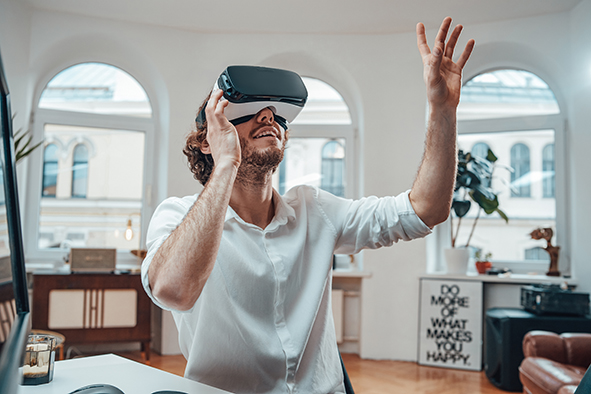Ihre Vorteile im Überblick
Mit einer Registrierung bei myWIFI können Sie Ihre Kontaktdaten und Ihr Profil ändern und jederzeit einen Überblick über Ihre WIFI-Kurse und Prüfungsergebnisse abrufen.
LOGIN / REGISTRIERUNG


WIFI Extended Reality Hub
We have been playing and we have been losing badly: the game of effectively, continuously and motivationally educating our population. The skills gap is one of the great challenges of the 21st century which no business, no country, no economy can escape. The time has come to flip this game on its head.
What if there were a way to inspire learners, capture their imaginations, introduce them to unexplored opportunities and use their talents. All while leaving them wanting to learn more? We, the Styrian Economic Chamber in Austria, believe teaching through virtual reality (VR) holds the answer.
‘Gamifying’ learning through VR training has the potential to reignite the youth’s inherent thirst for learning by engaging them in the interactive digital world. Its fundamental concept of learning by doing can inspire all types of learners, whatever their age. Time and again, the traditional theory-based learning methods via frontal teaching or video conference have been exposed as overwhelmingly ineffective in developing the skills which businesses of all sizes need.
This is the inspiration for “The Extended Reality Hub”. We implement technology which generations Y, Z and Alpha consider to be fun and use it to teach meaningful, real-world professional skills. This encourages young professionals to engage more actively with what they would otherwise consider boring as well as capture their attention and improve concentration levels - all at a price and on a scale which has never been done before.
Our Extended Reality Hub is breaking the glass ceiling when it comes to training. Our Chamber seized the opportunity and created programs to provide SMEs with the opportunity to use VR in training their workforce. These courses also give future employees the chance to explore the job beforehand to avoid wrong career choices. The Chamber provides the courses, environments and lessons in cooperation with businesses. Furthermore, there is the potential to develop a ‘VR course database’ which Chambers across the world could access to find content which has already been created by another Chamber. This content can then be recycled, updated, have languages added or even adapted to tailor it to the Chamber’s specific needs. The application potential for VR learning across different industries, for different specialisations and subjects is virtually limitless.
The conventional ways of educating for the future have been a driving factor in the creation of the skills gap problem. It is crucial that we turn to the unconventional, the innovative and the aspirational to fix it.
